Only US Astronaut To Fly On Mercury, Gemini, Apollo
It is with sadness Aero-News reports that astronaut Walter Marty
("Wally") Schirra, Jr. passed away Thursday at the age of 84.
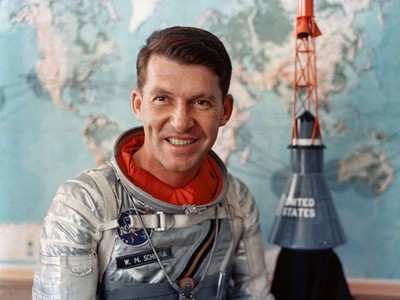
Originally recruited as one of the original Mercury 7 astronauts
by NASA in 1959, Schirra would go on to become the only astronaut
to fly in the agency's first three manned space programs --
Mercury, Gemini, and Apollo. Each of his missions built on those
before, and laid the foundation for more advanced missions to
follow.
Schirra flew on the fifth Mercury flight in 1962, orbiting the
Earth six times in his Sigma 7 capsule -- the longest US manned
space mission up to that point. He commanded Gemini 6A in 1965, a
flight with Tom Stafford that had the historic distinction of being
the first rendezvous of two manned, maneuverable spacecraft.
NASA states Schirra's Gemini flight with Stafford was something
of an improvisation. They had been scheduled to rendezvous in orbit
with an unmanned Agena to be launched 90 minutes before the Gemini
liftoff. But six minutes after the Atlas-Agena left the pad it
exploded, and the Gemini 6A launch was postponed.
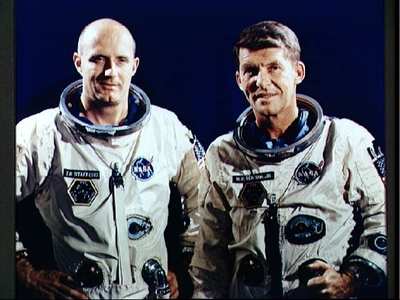
NASA then decided to use Gemini 7 as a rendezvous target for
Gemini 6A. Both were to be launched from Pad 19 at Cape Canaveral,
so a record turnaround of the pad was necessary. Working around the
clock, crews got the pad ready in just eight days after the Gemini
7 liftoff.
The Gemini 6A countdown reached zero on December 12, 1965, and
the rocket engines ignited -- then shut down. The two astronauts
had to wait almost half an hour atop the fueled rocket before
getting out of the capsule. The problem turned out to be minor, the
failure of an electrical connection.
Three days later, Gemini 6A was launched without a hitch (NASA
states that, on liftoff, Schirra admonished/encouraged the booster:
"For the third time, go!") Gemini 6A and Gemini 7 later flew in
formation for five hours, at one point as close as one foot to one
another. (A more detailed account of that flight is available here.)
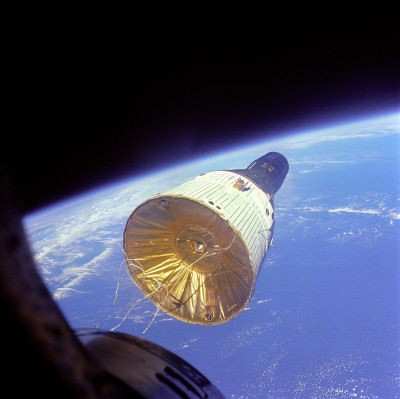
Three years later, Schirra commanded Apollo 7 -- the first
manned Apollo flight, which followed the January 1967 launchpad
fire that claimed the lives of Apollo 1 astronauts Edward White,
Roger Chaffee, and Virgil Grissom (who was also a Mercury and
Gemini astronaut.) During the 11-day flight of Apollo 7 in 1968,
Schirra and fellow crewmembers Walt Cunningham and Donn Eisele
tested the redesigned Apollo systems, and proved the spacecraft was
ready to take astronauts to the moon.
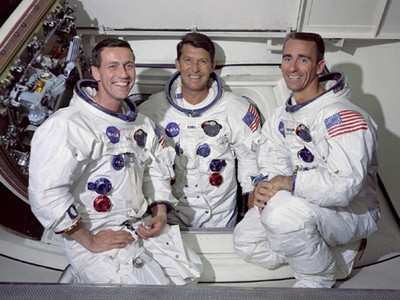
Schirra retired from the Navy as a captain, and from NASA in
1969 -- after which, he teamed with Walter Cronkite on CBS
Television, becoming a well-known spaceflight
commentator. Schirra worked for CBS from 1969 to 1975, and
later formed his own consultant company, Schirra Enterprises, in
1979.
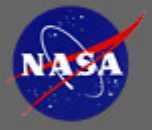 Walter M. Schirra was born in
Hackensack, NJ on March 12, 1923. He graduated from the US Naval
Academy in 1945, and from Naval Flight Training at Pensacola Naval
Air Station, FL in 1947. After service as a carrier-based fighter
pilot and operations officer, he attended the Naval Test Pilot
School at Patuxent River, MD. During the Korean War he flew F-86
Sabres under an exchange program with the Air Force.
Walter M. Schirra was born in
Hackensack, NJ on March 12, 1923. He graduated from the US Naval
Academy in 1945, and from Naval Flight Training at Pensacola Naval
Air Station, FL in 1947. After service as a carrier-based fighter
pilot and operations officer, he attended the Naval Test Pilot
School at Patuxent River, MD. During the Korean War he flew F-86
Sabres under an exchange program with the Air Force.
Schirra's military awards included the Navy Distinguished
Service Medal, three Distinguished Flying Crosses, three Air
Medals, two NASA Distinguished Service Medals, the NASA Exceptional
Service Medal and the Philippines Legion of Honor. He was active in
a number of organizations, and was a founding member and director
of the Mercury Seven Foundation.
Schirra also was a director of the San Diego Aerospace Museum, a
trustee of the Scripps Aquarium, and a member of the International
Council of the Salk Institute.
 ANN's Daily Aero-Linx (05.06.25)
ANN's Daily Aero-Linx (05.06.25) ANN's Daily Aero-Term (05.06.25): Ultrahigh Frequency (UHF)
ANN's Daily Aero-Term (05.06.25): Ultrahigh Frequency (UHF) ANN FAQ: Q&A 101
ANN FAQ: Q&A 101 Classic Aero-TV: Virtual Reality Painting--PPG Leverages Technology for Training
Classic Aero-TV: Virtual Reality Painting--PPG Leverages Technology for Training Airborne 05.02.25: Joby Crewed Milestone, Diamond Club, Canadian Pilot Insurance
Airborne 05.02.25: Joby Crewed Milestone, Diamond Club, Canadian Pilot Insurance







